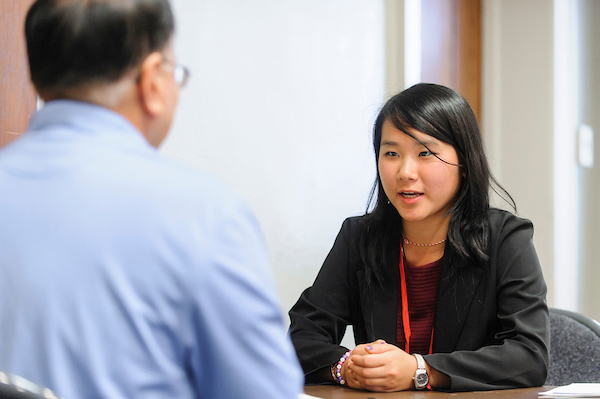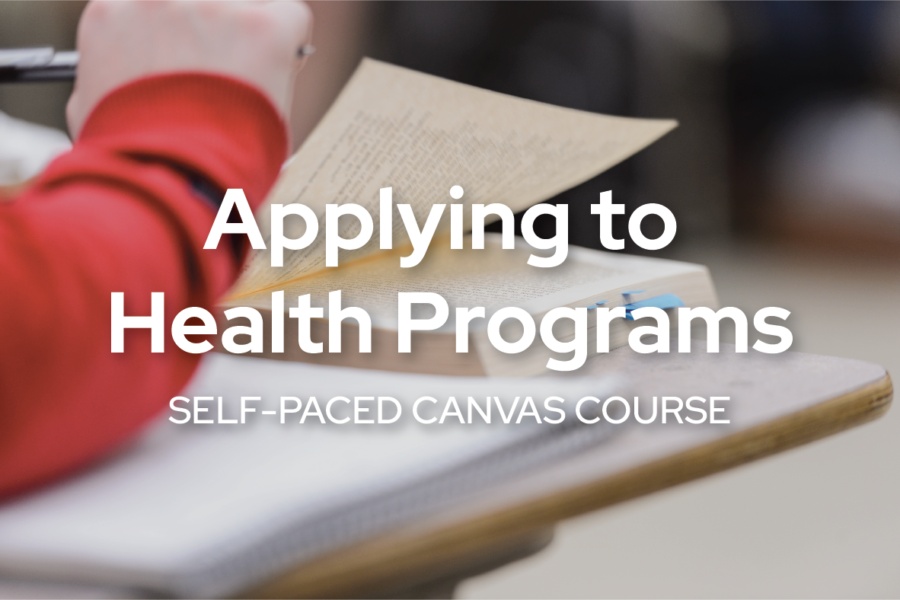CPHA is here to support you in preparing for and applying to health professional programs. This page will give an overview of some application components.
For much more in-depth guides to applying to specific health professions programs, sign up for CPHA’s Applying to Health Programs Canvas Course the year you plan to apply.
These are free, non-credit, self-paced courses for current students and alum that serve as resource libraries for the dental, medicine, physician assistant, physical therapy, occupational therapy, optometry, public health, and veterinary medicine applications.
For questions and support regarding your application, visit our Applicant Advising page.
Holistic Review
Health professional programs use a process called holistic review to look at core competencies, academic preparation, experiences outside the classroom and personal factors to determine an applicant’s “readiness” for healthcare. Put together, these create a picture of you as a whole person – both inside and outside of the classroom. The following are elements of holistic review:
This is an accordion element with a series of buttons that open and close related content panels.
Core Competencies for Health Professions
Many health programs provide a list of core competencies that they consider necessary skills, sensitivities, character traits, and awareness for applicants to demonstrate when they apply. Think of your application as an evidence-based document, and the following lists as examples of what you need to provide evidence for:
- All Professions: Interprofessional Education Collaborative Core Competencies
- American Association of Colleges of Osteopathic Medicine
- American Association of Medical Colleges
- American Association of Physician Assistants
- Association of American Veterinary Medical Colleges
- American Physical Therapy Association
Academic Preparation
- GPA (cumulative and science)
- Trends in your academic work (consistency is best, but an upward trend can be helpful and it is typically possible to provide a narrative to explain these trends)
- Completion of prerequisite coursework
- Professional Exam Score (DAT, GRE, MCAT, OAT)
Experiences Outside the Classroom
- Health & Non-Health Jobs
- Volunteering
- Campus Involvement
- Shadowing and/or Informational Interviewing
- Research
- Personal Interests or Hobbies (intramural sports, music, etc.)
- Studying abroad, language skills, cultural immersion and/or experience learning from others
Personal Factors
- Demonstrated Interest in Healthcare
- Letters of Recommendation (LOR’s)
- Maturity and thoughtfulness expressed in your writing
- Demographic Factors
- Citations/Institutional Actions
Timeline
Everyone’s path to a career in healthcare looks different. CPHA is here to help you decide when it is best for you to apply. Schedule an appointment or drop by during drop-ins to discuss your timeline with an advisor!
Applications for different health professions programs open at different times of the year. Generally, you’ll submit your application about 1 – 1.5 years before you plan to start your professional program. For example, if you wanted to start medical school in Fall 2028, you’d submit your application in May/June 2027. If a school uses rolling admissions, you should submit as early as possible.
Gap year(s), or intentional time graduates take after completing their high school or undergraduate education and before pursuing additional schooling, are common in healthcare. Gap time might be a great option for you, or it might not be. There isn’t a standard answer for everyone, so let’s talk!
When to Submit Your Application
- Dental & Medical: late May or early June
- PA: early May if you are not waiting for Spring grades, late May or early June if you are waiting for spring grades
- OT/PT/Vet Med/Optometry: late July or early August
- Public Health: December or January for Fall start programs

Professional Exams
Some health programs require applicants to take standardized exams as part of the application process. In most cases, students should plan to take the exams before applying to programs. Some standardized exams include:
- DAT (Dental Admission Test)
- GRE (Graduate Record Exam) – required for some PA, PT, OT, DVM, and MPH programs
- MCAT (Medical College Admissions Test) – required for MD and DO programs
- OAT (Optometry Admission Test)
In addition to standardized exams to test knowledge, some programs use Situational Judgement Tests (SJTs) to gauge an applicant’s people skills in areas of collaboration, communication, empathy, equity, ethics, motivation, problem solving, professionalism, resilience, and self-awareness. SJTs can often be taken after you apply to programs while you wait for your application to be verified.
Examples of SJTs include:
This is an accordion element with a series of buttons that open and close related content panels.
Fee Assistance
Professional exams are associated with a cost, but fee assistance exists to lift some financial burden. Apply for fee assistance to cover all or part of your exam cost. (Both standardized exams and sometimes Situational Judgement Tests.) Some programs also give benefits such as free test prep materials.
You’ll usually need to apply for fee assistance before registering for your exam, as benefits are not retroactive.
Accommodations
It is helpful and important to apply for accommodations if you have a disability or medical condition that requires an adjustment to standard testing conditions. Apply for accommodations early to ensure they’re in place on your test day.
Resources
Test prep resources vary widely in price and format. Learn more and compare resources on our MCAT 101 or Applying to Programs Canvas pages.
Centralized Application Service
Most health professions programs use a centralized application service that is similar to the Common Application you may have used to apply to college. You can apply to multiple programs through one application. Schools that don’t use a common application will usually have you apply directly to their program and their specific graduate school.
What goes into the Central Application?
- Biographical information
- Transcripts from every college or university attended
- Professional Exam Score (DAT, GRE, MCAT, OAT)
- Experiences, Achievements, Licenses and Certifications
- Essays
- Letters of Recommendation
Fee Assistance Programs
While health professions program applications often have fees, most applications provide a full or partial fee waiver to applicants who meet certain income requirements.
Some also give benefits such as free test prep materials and reduced professional exam fees.
But, it’s important to read the fine print! Some fee waiver programs require that you submit your application within a certain amount of time after receiving the waiver, they’re usually not retroactive, and they’re sometimes available on a first come, first served basis.
Fee Assistance Programs by Profession
- Dental — AADSAS Fee Assistance
- Medical — AACOMAS (DO) Fee Assistance and AMCAS (MD) Fee Assistance
- Occupational Therapy — OTCAS Fee Assistance
- Optometry — OptomCAS Fee Assistance
- Physical Therapy — PTCAS Fee Assistance
- Physician Assistant — CASPA Fee Assistance
- Public Health — SOPHAS Fee Assistance
- Veterinary Medicine — VMCAS Fee Assistance
Selecting Schools
CPHA can help you think through where to apply. Below are some examples of things to consider as you decide on your school list:
- Mission statement
- Commitment to diversity, equity, inclusion, and justice
- Admission requirements
- Location
- Class size
- Tuition and financial aid
- Personal and professional support
- Curriculum structure
- Clinical experience options
- Opportunities for research
Virtual Fairs
Watch for virtual fairs where you can talk with a number of schools at one event. This is a great way to ask questions about admissions requirements and learn more about programs to guide your school selection.
Watch the CPHA newsletter, Instagram, and announcements on Canvas for information about upcoming virtual events. You can also follow professional organizations, and specific programs on social media, as well.

Resources
Many educational associations have databases, reports, or program directories with information that can help as you’re learning about programs.
- Dental — ADEA Official Guide to Dental Schools
- Medical — DO Explorer (DO) and MSAR (MD)
- Occupational Therapy — ACOTE School Directory
- Optometry — ASCO Optometry Programs Admissions Directory
- Physical Therapy — PTCAS Program Directory
- Physician Assistant — PAEA Program Directory
- Public Health — ASPPH Academic Program Finder
- Veterinary Medicine — VMSAR School Directory
Essays
There are a variety of essays associated with the application process. Essays are your opportunity to synthesize your application components into a narrative for the admissions committee. Below is a general overview of common application essays. Enroll in our Applying to Health Professions Canvas course for a more in-depth look at writing application essays.
Besides CPHA, the UW-Madison Writing Center is another important resource to utilize during your brainstorming and writing process. The Writing Center offers a variety of services and events, including this recorded session on Writing Successful Statements for Graduate Health Professions Programs.
This is an accordion element with a series of buttons that open and close related content panels.
Personal Statements
Personal statements are your chance to show admissions committees who you are, why you are pursuing the profession of your choice, how you have explored this interest, and how you have already begun to gain and grow in skills, competencies, and qualities that will make you an excellent healthcare provider in this particular field. They are generally 1-2 pages in length.
Experience Statements
Experience statements are your chance to show admissions committees what your role was, what you did, and what you learned from each experience. They’re generally a paragraph long. Some programs (ex. MD) will let you designate a certain number of experiences as most meaningful and give you extra space to describe them.
Additional Essays
Some centralized applications allow applicants to respond to additional essay prompts as needed. Common topics include institutional actions and other impactful experiences.
An ‘institutional action’ essay allows you to explain the context surrounding an institutional action and what you’ve learned from the experience.
An ‘other impactful experiences’ essay allows you to include information about your background (i.e. obstacles you’ve faced or challenges you’ve overcome) that is not captured elsewhere.
Supplemental/Secondary Essays or Program Materials
Some, but not all, professional programs embed additional, school-specific essays into the central application. Other programs will invite you to submit secondary essays after they’ve received your primary application.
Common topics include: ‘why this school?’, challenges faced, experiences related to diversity, leadership and/or working in groups, updates to your application, etc.
Their length varies from 350 to 3,000 characters.
Letters of Recommendation
While most health professions programs require letters of recommendation as a part of your application, the number of letters required varies. Many programs require letters to come from specific people, such as science faculty or healthcare professionals. Be sure to read the application closely.
Note: UW-Madison does not provide committee letters. You will get individual letters to send to programs.
Ask your letter writers if they are willing to write a letter as early as possible in the year you plan to apply—ideally, the fall or early spring before your application. Ask the individual what they need to know about you (motivations, preparedness, accomplishments, etc.) in order to be able to write specifically about these things in their letters. It may be helpful to provide them with your resume and a draft of your personal statement.
You do not need to get physical copies of letters. Once the application opens, you will enter the contact information for each letter writer into the application service which will send an email to the letter writer with instructions for submitting. You will not be able to read the letter. You must waive this right.
Remember to send a thank you note to your letter writers and keep them in the loop about acceptances!
Interview Preparation
Many health professions programs conduct applicant interviews as a part of the application process.
Schools conduct interviews to help them make admissions decisions. Interviews are opportunities for admissions committees to meet you in person and learn more about you. They are also your opportunity to learn about a school, its faculty, and its students.

After Applying
After putting so much time, money, and energy into the application, it can be difficult to not hear back right away. But no news is technically good news and it is normal to go through periods of time without hearing anything from programs.
We advise limiting your time on online pre-health applicant forums to avoid comparing yourself with other applicants.
Take time to reconnect with people who bring you joy!
This is an accordion element with a series of buttons that open and close related content panels.
Apply for Financial Aid
Apply for financial aid through FAFSA while you wait to hear back from programs.
Updates
Some programs allow updates at designated times through the central application while others will accept them through the platform where you submitted your secondary essays or by emailing the admissions office. Not all programs accept updates, however, so check your programs’ policies first.
Keep updates short – generally 1-2 paragraphs. Include your continued interest in the school along with new and continued experiences, grades, and life changes.
We advise applicants who applied in late spring/early summer to start sending updates in October and every 6-8 weeks afterwards.
Waitlists
A waitlist decision can come with mixed emotions, but it does mean that a program likes you and knows you can do the work. Keep sending updates and consider a letter of intent for your top program (if the school allows additional updates/letters).
Letters of Intent
A letter of intent is reserved for your top program. These letters are usually sent after receiving a waitlist decision (with the intention of getting an acceptance) or after receiving an acceptance (with the intention of getting financial assistance).
The letter of intent includes why the school is your top program and how they’ll help you achieve your vision for the kind of healthcare professional you’ll become.
We advise waiting to send until spring (for most programs), when your letter of intent will have the most leverage.
Reapplying
If your first application didn’t go how you hoped, hang in there! You’re still on the journey to become a health professional, and reapplying can be a part of that journey for many people..
Meet with CPHA to talk about how you can improve your application before reapplying.
Navigating Acceptances
After an acceptance, most programs will let you pay a deposit to hold your spot in a class while still waiting for other offers.
Pay attention to deadlines when you’ll have to narrow down acceptances or commit to enroll at programs.
You may be able to negotiate for more money by leveraging multiple offers. Consider sending a letter of intent.
Let us know where you plan to enroll by emailing questions@prehealth.wisc.edu. We want to celebrate with you! With your permission, we can add you to our alumni database.

